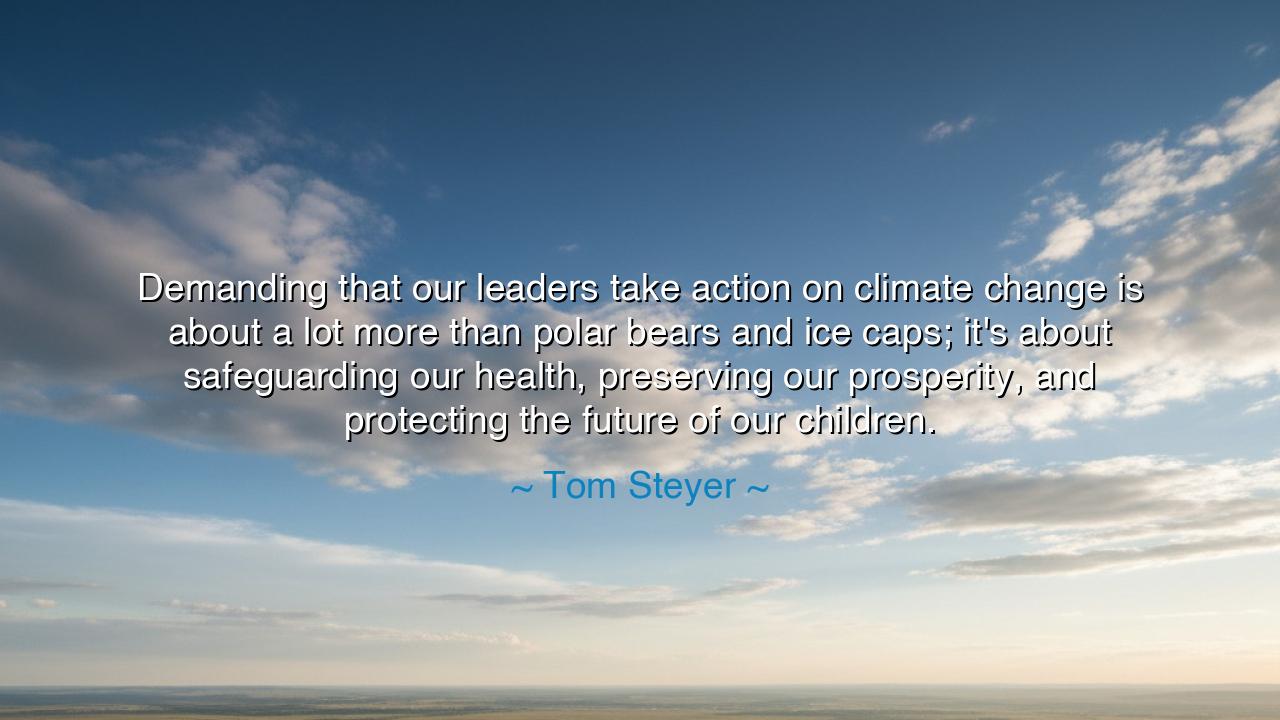
Demanding that our leaders take action on climate change is about
Demanding that our leaders take action on climate change is about a lot more than polar bears and ice caps; it's about safeguarding our health, preserving our prosperity, and protecting the future of our children.






The words of Tom Steyer — “Demanding that our leaders take action on climate change is about a lot more than polar bears and ice caps; it's about safeguarding our health, preserving our prosperity, and protecting the future of our children.” — are both a plea and a prophecy. They remind us that the struggle against climate change is not a distant or abstract battle, but one that touches every breath we take and every life yet unborn. Beneath these words lies an ancient truth — that the fate of the earth and the fate of humanity are one and the same. Steyer’s voice rises as a clarion call, urging us to look beyond symbols of melting glaciers and endangered beasts, and to see what truly hangs in the balance: the well-being of our civilization, the health of our people, and the survival of our descendants.
In the ancient world, the wise understood that nature was not an enemy to be subdued but a covenant to be honored. The farmers of Egypt watched the Nile’s rhythm as sacred; the tribes of the Americas offered prayers to the rivers, winds, and trees that sustained them. They knew that when man breaks his harmony with the earth, the earth answers not with anger, but with imbalance — storms, droughts, and famine. Steyer’s words carry that same wisdom reborn for the modern age. He warns that the devastation of ecosystems is not merely an ecological concern, but a mirror reflecting our moral decay — that to destroy the earth is to destroy ourselves.
The origin of this reflection comes from Steyer’s journey — a man who turned from the world of finance to the world of stewardship. Having seen the machinery of modern wealth, he recognized that unchecked profit often devours the very foundation upon which prosperity stands. His words spring from a vision that ties the environment not just to nature, but to the economy, to justice, and to the human spirit. He understands that “preserving our prosperity” means more than protecting markets — it means ensuring that no child must drink poisoned water, that no farmer must watch his crops die under a burning sky, that no community must flee from fires and floods created by mankind’s negligence.
History gives us lessons written in both ash and hope. When the Dust Bowl swept across America in the 1930s, it was not a natural disaster alone, but the consequence of man’s reckless plowing and pride. Fields once rich with life turned to wasteland, and families wandered the land like exiles from a fallen Eden. Yet from that suffering came renewal: new laws to conserve soil, to plant trees, to heal the wounds of the earth. The lesson then, as now, is clear — the health of the land is the health of the people, and those who ignore that bond sow ruin for generations.
Steyer’s invocation of “our children” is more than sentiment — it is the language of legacy. Every civilization must answer a sacred question: What shall we leave behind? Will we gift our descendants clear skies and fertile fields, or burden them with seas that swallow cities and air that suffocates life? To act on climate change is not merely political; it is spiritual — a moral duty to those who come after us. Just as ancient builders laid stones they would never see completed, so must we plant the seeds of renewal that others may one day harvest in peace.
His words also confront a deeper blindness — the notion that climate change is about distant places or helpless creatures. “Polar bears and ice caps” may awaken sympathy, but Steyer calls us to recognize that the truest danger is not remote — it is within our lungs, our homes, and our communities. When the air grows toxic and the waters unclean, when heat breeds disease and famine, it is not nature that suffers first, but humanity. Thus, the fight for the planet is the fight for ourselves — for our bodies, our economies, our children’s laughter. To demand action is not rebellion; it is self-preservation.
So, my children, hear this wisdom and let it take root in your hearts: the earth does not belong to us — we belong to the earth. To defend her is to defend the sacred circle of life that binds all living things. Raise your voices not in fear, but in resolve. Choose leaders who honor truth, and hold accountable those who trade the planet’s future for fleeting gain. Let every act of conservation, every tree planted, every word spoken in defense of the planet be your offering to the generations yet to come.
For in the end, as Tom Steyer teaches, climate action is not a struggle of science alone — it is a test of the human soul. If we find the courage to act, we will not only save the forests, the oceans, and the sky; we will save ourselves — our health, our prosperity, and the unbroken chain of life that began long before us and must continue long after we are gone. This is the legacy we are called to build — a living world, thriving and whole, passed from our hands into those of our children.






AAdministratorAdministrator
Welcome, honored guests. Please leave a comment, we will respond soon